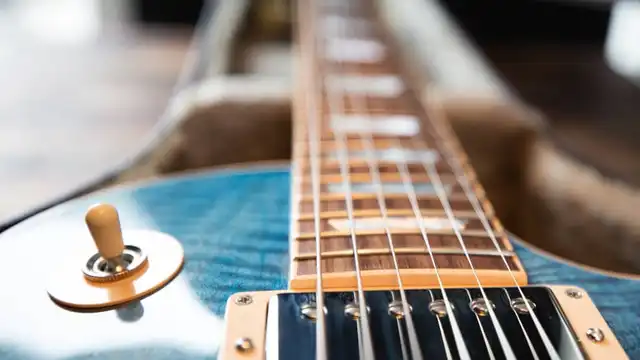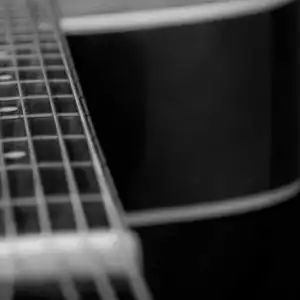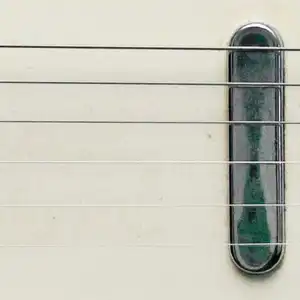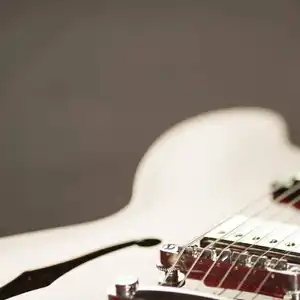Are Guitars Meant to be Played With a Certain Type of Strings?


Be sure to subscribe to our YouTube channel to keep up with more great videos like this one.
Today we're talking about whether or not certain guitars are meant for a certain gauge of strings, what it means when you hear that in different places, whether it's ever the case, whether it never really matters, et cetera, et cetera. So there's a couple of different circumstances in which people will talk about how their guitar or a guitar is only meant for a certain gauge, alloy or type of string. We're going to talk about each of those today and whether or not I think they're valid. This is basically my opinion so you're kind of going with what I think here. Certainly, if you think that your guitar is just meant for a certain gauge of string, maybe you're right, who knows. But let's talk about it."But Jazzmasters were designed for flatwounds..."
The first circumstance I hear pretty often is where people are talking about how a particular guitar was perhaps designed with a certain set of strings in mind and how it can't really work with any other. The one that comes to mind the most is that you do hear some people talk about how Jazzmasters and Jaguars were just designed for flatwound strings—they won't work with any other type of strings, it's just not the same thing. Now, while I'll admit that it's very possible that a flatwound string might work well in a Jazzmaster or a Jaguar, I don't think it's fair to say that they were made for these strings, and as such, no other strings will work for them. For one, back when those guitars were designed, people were using roundwound and flatwound strings, I know that Jazzmasters were initially meant to be guitars for jazz players—so they probably factored in that they might be using flatwound strings—but that doesn't mean that those are the only strings that would work on them. The second thing that I think that is most telling about something like this, is the fact that most all guitars were designed in the first place back in a period in which people were playing really, really heavy strings—like really heavy—like 14 to 60 or something like that. So to a certain point, all guitars were kind of designed with that in mind. So I think it's a little bit weird to cherry pick and say that a given guitar was just designed for flatwounds or originally designed for really heavy gauge strings, when in truth, kind of all guitars were—and they generally work just fine with things like 10s or nines or 11s or what have you. So I think it mostly isn't a really valid critique to say that Jazzmasters just have to be played with flatwounds. Now, all that said, I do have certain preferences and opinions about what I think works well on certain guitars. Jazzmasters, for example, I really love a set of 11s on—9s kind of feel a little bit weird to me on there. 10s are all right, 12s get to be a little bit too much. But that's a little bit more about how I want to accentuate or avoid different things about the Jazzmaster that are great or negative and that just really varies on who you are and what you're looking to make your guitar do. For one player the boominess of a Les Paul might be something they want to accentuate and really just totally dive into, and for other people, they might really dislike that and want to go with a little bit of a thinner gauge string or a stainless steel alloy or something like that to get it to sound a little bit less boomy and bottom heavy and "Les Paul-y". That is all to say I don't personally buy this critique."But [brand] only recommends I use their .012s..."
The second and probably most common circumstance in which people will talk about guitars having been meant for a given gauge of strings is when you're getting that information from the manufacturer themselves or the manufacturer will say this guitar was set up for a given gauge of string and that's what we recommend using on it. Now, for whatever reason, I don't hear this critique from electric players all that often. I think that's probably because most electric guitars are set up for 9s from the factory and pretty much every electric guitarist that I know, with certain exceptions, immediately gets a guitar, if it's new, with 9s on it and swaps them out for 10s or 11s or whatever. So I think electric players are more just used to the idea that they're going to have to put different strings on their guitar and maybe adjust a few things to make it work just right. The place that I do see this come up a lot is with acoustic guitarists. I hear from a lot of acoustic guitarists that will say, Taylor or Martin or whoever recommends only this gauge set of string for my guitar and so that's the only gauge set I can use. So, ultimately this isn't too much of a different thing with acoustic guitars than it is with electric guitars even though acoustic guitarists, I think, are a little bit more sensitive to it. Any acoustic guitar can work for a variety of gauges. They're certainly well rated for anything from 10s to 13s or probably even 14s in many cases without having any trouble. The things that are going to always change are just things that the factory set up in the first place. On electric guitars, intonation at the bridge is one of the first things that's going to change if you do change your gauge, especially if you change it quite a bit. If you go from 9s to 9.5s, it's probably not a huge deal. If you go from 9s to 11s, you'll probably need to turn some screws a little bit to get everything to intonate just right. The second aspect with electric guitars is things like the springs in your tremolo system. If you have a hard tail guitar, this isn't an issue at all. But if you do have a trem system there is like a certain point at which the gauges can be too much, so that is one thing to keep an eye on. And the other place you're going to want to keep an eye on when changing string gauge is your guitar's nut. A lot of companies like to cut nut slots super, super tight. It's actually like a huge pet peeve of mine when it comes to buying a new guitar. Every electric guitar company seems to love cutting their nut slots for 9s even though that's what hardly anybody plays and you have to do work on it to get a set of 11s or 10s to work well on it which I think is kind of silly. But, the same thing is true for electric guitars or acoustic guitars, you might have to widen your nut slot just a little bit to get it to accommodate the gauge of strings you're most comfortable with. That's totally fine, even if you go back down in gauge a little bit after that, they're going to work just fine in those nut slots. Ultimately just because Taylor or Fender or whoever says that there is a certain gauge they recommend for their guitar, doesn't mean you can't use a different gauge of string at all. It doesn't even mean that the majority of players that own that guitar use that particular string. It just means you might, at the front end, have to do a little of intonation set up or a little bit of nut set up, or both, or maybe not at all—just depending on how that guitar was set up."But that's what I like..."
So the third and final instance in which I will hear players talk about how a given guitar is meant for a given set of strings is one that I actually think has a lot more legs than the others. This calls to mind what Tommy Emmanuel says, that on given guitar, you have to try a number of sets of strings on it to sort of feel what feels right, what sounds right on that given guitar—and then over time a lot of times he'll even try things out again and make a switch because the guitar has sort of changed or maybe just what he's looking for has changed with the guitar. I think this is actually pretty savvy, especially when it comes to acoustic guitars. I'm very much this way. If I get a new guitar, I might play the strings that come on it for a minute. Then I might go to 10s, I might go to 11s, go to 9s, 11.5s, what have you. I might try a wound third, a heavier bottom, who knows. I very much like to try a bunch of different things and I do, a lot of times, settle in to something that I think is just what works perfectly on a given guitar. Acoustic guitars are especially this way too. A lot of people will get two different acoustic guitars or rather they'll have one they love and they'll buy another that has a totally different wood on it and then they'll put the same set of strings on it and find that the strings that sound perfect and bring their 000 to life, on a mahogany guitar just sound dull and dead and flat. That's normal. Different guitars, especially acoustics, are made with different woods, they resonate differently and they kind of call for different things. In this case, I do think this perspective is appropriate, so long as it's meaning that you're trying out a bunch of different sets of strings, different gauges, different alloys, et cetera, and finding whatever works perfectly on that guitar for you. But, I think it's important to make the distinction that just because a given set of strings works perfectly on a given guitar for you, doesn't mean that will be the case for another player. All players are different. Some people like 7s, some people like 19s. You do what you can and you play with what makes your playing more fun and more exciting and makes you want to pick up the guitar. So, I'm curious to hear your thoughts. Do you hear a lot of people saying stuff like this? Do you have a guitar that you think is just meant for a given set of strings? What set is it? We'd love to hear all about it down in the comments.Other Posts you may like

Guitar Strings Order: How the Guitar is Tuned and Why

Best Acoustic Guitar Strings for Beginners

Two Handed Tapping: Our Top 8 Tappers of All Time

Which Guitar Strings Wear Your Fret Wire Down More?

What is Nashville Tuning? Its History, Best Guitar Strings & Uses

Guitar Scale Length Explained: String Tension & Playability
0 Responses
Leave a Reply
Your email address will not be published. Required fields are marked *




